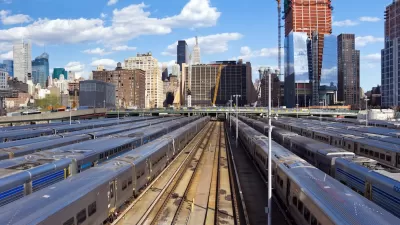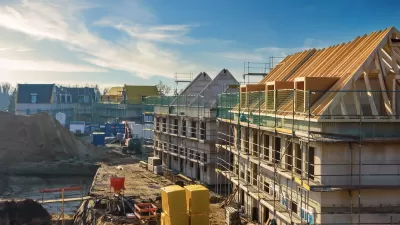No-cost land transfers of underused transportation assets to develop transit-oriented affordable housing could be a game changer for local governments.

Under new guidance from the US Department of Transportation, localities can use assets like land and buildings acquired or improved with federal transit funds to support development of affordable housing, report Jorge González-Hermoso and Yonah Freemark of the Urban Institute.
The new guidelines, called Interim Asset Disposition Guidance, released in October, could help boost housing construction near transit, which has slowed because of increasing development costs and a slow return of transit ridership after the pandemic.
Qualifying transportation assets that are no longer needed for the original purchase can be transferred to local governments, nonprofit organizations, or third-party entities at no cost as long as the properties are used for transit-oriented developments where at least 40 percent of housing units are reserved for low or very low income households. This has huge implications for viability of such projects, as previously transit agencies had to pay back the federal monetary contribution when seeking to transfer assets to other entities.
The Urban Institute speculates a significant portion of available unused land holdings were likely used for construction staging near large projects like rail routes, elevated lines, or subways. As such, they offer several recommendations to ensure state and local governments can take full advantage of these new rules to both increase affordable housing and transit ridership.
Those tips include ensuring zoning policies on land adjacent to stations align with the goal of maximizing density on those sites, focusing affordable housing subsidies on projects that are located on underused, transit-adjacent sites, and planning for property disposition at the start of any new transit project to ensure planning for residential investments can begin as soon as possible.
FULL STORY: Leveraging Underused Transit Properties Could Produce More Affordable Housing

Alabama: Trump Terminates Settlements for Black Communities Harmed By Raw Sewage
Trump deemed the landmark civil rights agreement “illegal DEI and environmental justice policy.”

Study: Maui’s Plan to Convert Vacation Rentals to Long-Term Housing Could Cause Nearly $1 Billion Economic Loss
The plan would reduce visitor accommodation by 25% resulting in 1,900 jobs lost.

Planetizen Federal Action Tracker
A weekly monitor of how Trump’s orders and actions are impacting planners and planning in America.

Wind Energy on the Rise Despite Federal Policy Reversal
The Trump administration is revoking federal support for renewable energy, but demand for new projects continues unabated.

Passengers Flock to Caltrain After Electrification
The new electric trains are running faster and more reliably, leading to strong ridership growth on the Bay Area rail system.

Texas Churches Rally Behind ‘Yes in God’s Back Yard’ Legislation
Religious leaders want the state to reduce zoning regulations to streamline leasing church-owned land to housing developers.
Urban Design for Planners 1: Software Tools
This six-course series explores essential urban design concepts using open source software and equips planners with the tools they need to participate fully in the urban design process.
Planning for Universal Design
Learn the tools for implementing Universal Design in planning regulations.
Caltrans
Smith Gee Studio
Institute for Housing and Urban Development Studies (IHS)
City of Grandview
Harvard GSD Executive Education
Toledo-Lucas County Plan Commissions
Salt Lake City
NYU Wagner Graduate School of Public Service





























